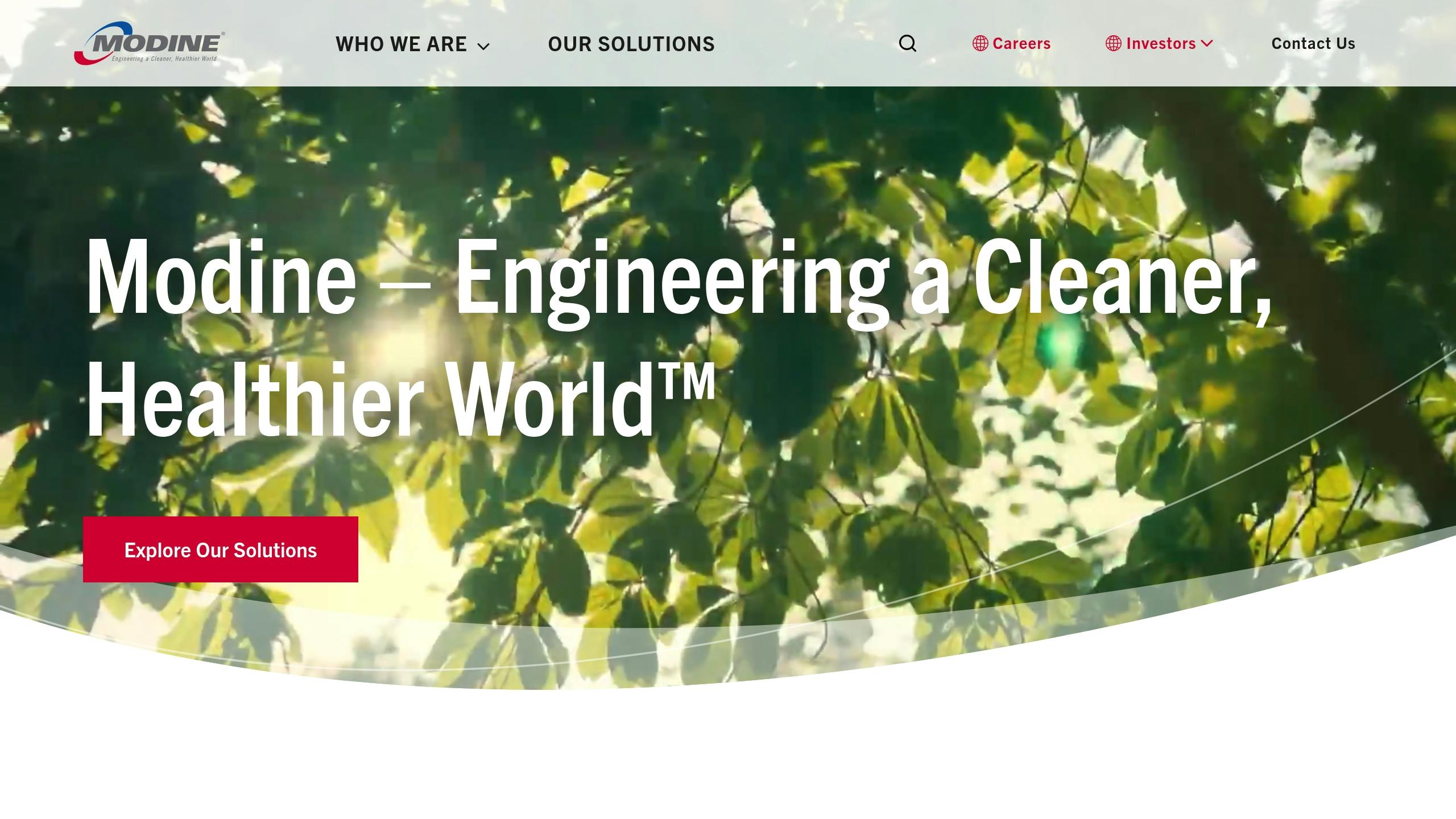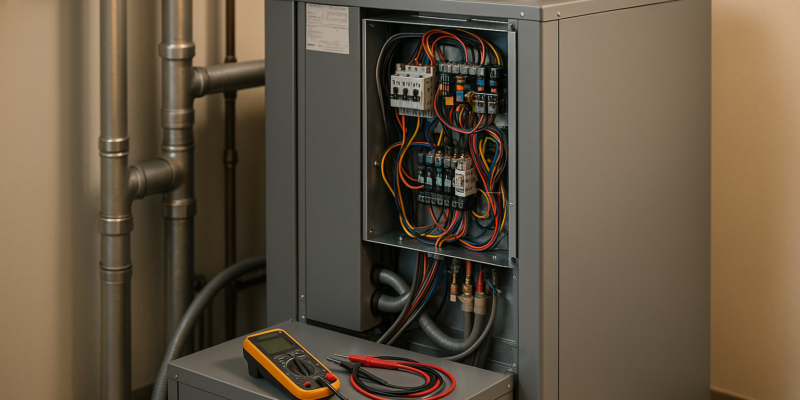Geothermal Heat Pump Electrical Issues: Common Fixes
Geothermal heat pumps rely on electrical systems to function effectively, but problems like frequent cycling, strange noises, or uneven heating can signal issues. Here’s how to address them:
- Key Components to Monitor:
- Control Board: Manages system operations; issues include sensor failures or programming errors.
- Capacitors: Essential for motor function; look for weak starts or failures.
- Wiring & Relays: Loose connections or damaged wires can cause erratic behavior.
- Pump Motors: Problems like burned windings or vibrations can disrupt fluid circulation.
- Common Signs of Trouble:
- Tripped breakers, blown fuses, or voltage drops.
- Clicking sounds, burning odors, or inconsistent operation.
- Motor overheating, buzzing noises, or delayed starts.
- Quick Fixes:
- Tighten loose connections, replace blown fuses, or clean relay contacts.
- Inspect wiring for damage and replace faulty capacitors.
Regular Maintenance Tips:
- Monthly: Check for unusual sounds or performance drops.
- Quarterly: Test safety switches and clear debris from vents.
- Annually: Full system inspection and calibration.
For complex issues like motor replacements or persistent electrical failures, consult a certified HVAC technician. Hydrodynamics Inc. specializes in diagnosing and repairing geothermal systems to keep them running efficiently.
How to Troubleshoot a Run Capacitor on a Modine Geothermal Heat Pump

Main Electrical Parts
Understanding the main electrical components of your geothermal heat pump can help you spot potential issues early and keep the system running smoothly. These parts work together to ensure consistent performance.
Basic Component Guide
The control board acts as the system’s brain, coordinating sensors and managing operational timing.
Geothermal systems rely on two types of capacitors:
- Start capacitors: Deliver the initial energy needed to start the motor.
- Run capacitors: Maintain steady motor operation over time.
Key electrical components for the compressor include:
- Contactor: Regulates power flow to the compressor.
- Start relay: Oversees the startup process.
- Overload protector: Shields the system from excessive current.
Circulation pump motors are made up of:
- Motor windings
- Terminal connections
- Speed controllers
- Thermal protection switches
The thermostat wiring system includes:
- Low-voltage control circuits
- Terminal connections
- Safety switches
- Zone control relays
Common Components and Issues
| Component | Primary Function | Common Issues |
|---|---|---|
| Control Board | Manages system operation | Programming errors, sensor failures |
| Capacitors | Powers the motor | Weak starting power, complete failure |
| Compressor Electronics | Directs power flow | Worn contacts, relay malfunctions |
| Pump Motors | Circulates system fluid | Burned windings, bearing issues |
| Thermostat Wiring | Regulates temperature | Loose connections, wire damage |
Regular inspections of these components are crucial for maintaining system efficiency. Professional technicians use specialized tools to test and repair these parts, so always rely on a qualified technician for electrical repairs. For expert service, reach out to Hydrodynamics Inc.
Up next: Learn how to recognize common warning signs.
Common Problems and Warning Signs
Spotting issues early can save you from expensive repairs and system breakdowns. Here are some key areas to keep an eye on.
Power Problems
Power-related issues can disrupt your system’s performance. Watch out for:
- Tripped circuit breakers: Frequent trips might mean an overloaded circuit or a short.
- Blown fuses: Repeated fuse failures often point to electrical issues.
- Voltage fluctuations: If lights dim or the system loses power during operation, there may be a problem with the power supply.
Your geothermal system should use power consistently. Sudden changes in electrical behavior should be checked by a qualified technician.
Relay and Wiring Issues
Problems with relays and wiring can lead to inconsistent operation or even complete system failure. Here’s what to look for:
| Warning Sign | Likely Cause | Impact |
|---|---|---|
| Clicking sounds | Faulty relay contacts | Irregular cycling of the system |
| Burning odors | Damaged wire insulation | Potential safety hazard, system shutdown |
| Erratic operation | Loose connections | Reduced efficiency, possible damage |
| Control board errors | Corroded wiring | System malfunction |
Inspect wiring for discoloration, loose terminals, or corrosion – these are clear signs of trouble.
Motor and Pump Failures
Electrical issues with motors and pumps can lead to various warning signs. Pay attention to the following:
Blower Motor Problems:
- Strange humming or buzzing noises
- Motor feels hot to the touch
- Delayed startup or failure to start
- Uneven airflow
Circulation Pump Issues:
- Noticeable vibrations during operation
- Irregular cycling patterns
- Reduced heating or cooling performance
- Electrical overload warnings
If you spot any of these signs, get your system checked by a certified technician right away. Hydrodynamics Inc. offers expert diagnosis and repair for geothermal heat pump electrical problems, ensuring your system runs safely and effectively.
Even minor signs can indicate bigger issues. Professional evaluation is crucial.
Next, find out how to identify these problems using safety checks and testing equipment.
Problem Detection Steps
Identifying electrical problems in geothermal heat pumps requires careful safety measures and accurate diagnostics. Follow these steps to locate issues and determine the best course of action.
Safety and Visual Checks
- Power Disconnection
Turn off the power at both the circuit breaker and the disconnect switch. Use a voltage tester to confirm the power is off. - Visual Inspection
Examine all accessible components for potential issues. Here’s what to check:
| Component | What to Look For | Warning Signs |
|---|---|---|
| Wire Insulation | Color and texture | Browning or brittleness |
| Terminal Connections | Tightness and corrosion | Loose screws or green deposits |
| Relay Contacts | Surface condition | Black spots or pitting |
| Capacitors | Physical appearance | Swelling or oil leakage |
Using Test Equipment
Once you’ve completed the visual inspection, move on to testing the system using the right tools.
- Voltage Testing:
- Set your digital multimeter to the AC voltage range (usually 240V).
- Test the incoming power at the disconnect switch.
- Measure voltage at terminal connections.
- Resistance Testing:
- Switch the multimeter to ohms (Ω) to check wire continuity and connections.
- Test motor windings for proper resistance levels.
- Measure relay contact resistance to ensure functionality.
Component Reset and Replacement
Sometimes, a simple reset can resolve minor faults. After resetting, inspect all connections before turning the power back on.
If the reset doesn’t work or if you find damaged components (e.g., bulging or leaking capacitors), replacement may be necessary. For parts like relays or components with stored electrical charge, consider consulting a professional technician.
For expert diagnostics and repairs, reach out to Hydrodynamics Inc. Their certified technicians have the skills and tools to handle your geothermal heat pump system.
Fixes and Maintenance
Basic Repairs
Here are some key fixes to ensure your system runs smoothly:
Connection Tightening
Make sure all connections at terminal blocks, contactors, and breakers are secure. Loose connections can cause system malfunctions and safety risks.
Fuse Replacement
Replace any blown fuses with ones that match the original ratings exactly. Using the wrong type can lead to further issues.
| Component | Repair Task | Tools Needed |
|---|---|---|
| Terminal Blocks | Torque to specifications | Calibrated torque screwdriver |
| Contactors | Clean contact surfaces | Contact cleaner, fine-grit sandpaper |
| Ground Connections | Check and tighten | Wire strippers, crimping tool |
| Control Board | Inspect for damage | Multimeter, thermal camera |
Sticking to regular maintenance alongside these repairs can help prevent recurring problems.
Regular Upkeep
Keep your system in top shape by following these routine checks:
Monthly Checks
- Monitor overall system performance and listen for unusual sounds.
- Inspect circuit breakers for any signs of wear or damage.
- Look over wiring for signs of fraying or deterioration.
Quarterly Maintenance
- Test all safety switches and control mechanisms.
- Clear out any dust or debris from electrical cabinet vents.
- Measure and record operating temperatures.
Annual Service
- Perform a full inspection of the electrical system.
- Test all safety controls to ensure proper function.
- Update maintenance logs with detailed records.
- Calibrate thermostats and sensors for accuracy.
Professional Service Guide
Some issues require expert attention. Reach out to Hydrodynamics Inc. for assistance with:
- Faulty circuit boards
- Motor replacements
- Persistent electrical odors
- Frequent circuit breaker trips
- Complicated control system problems
Hydrodynamics Inc. has over 29 years of experience in geothermal system repairs. Their certified technicians offer advanced diagnostic services, replacement of factory-authorized parts, system adjustments, safety checks, and performance verification.
To keep your system running efficiently and avoid costly breakdowns, schedule professional maintenance at least once a year. Regular checkups can catch potential problems early, saving you time and money in the long run.
Conclusion
The steps and tips shared above are essential for keeping geothermal heat pumps running smoothly. Addressing electrical issues requires a careful, safety-first approach. By understanding the main components, using the right testing tools, and sticking to a regular maintenance routine, you can stop small problems from turning into big ones.
While simple issues might be handled with a quick visual check or tightening loose connections, more advanced problems should always be left to certified HVAC technicians. These professionals bring the tools and expertise needed to accurately diagnose and fix complex faults in these systems.
Staying on top of scheduled maintenance helps your system last longer and run more efficiently. A thorough maintenance plan not only keeps your system in top shape but also lowers repair costs and ensures safe operation.
Because electrical work on geothermal systems can be tricky and requires strict safety measures, it’s always best to consult a certified HVAC professional if you’re unsure. Hydrodynamics Inc. provides skilled, certified technicians who are experts in diagnosing and fixing electrical issues in geothermal heat pumps, helping to keep your system reliable and efficient.
FAQs
What are the common electrical problems in geothermal heat pumps, and how can you spot them early?
Geothermal heat pumps can occasionally face electrical issues that impact their performance. Frequent problems include tripped circuit breakers, faulty capacitors, or loose wiring connections. These issues can cause the system to stop running or operate inefficiently.
To identify problems early, watch for signs like unusual noises, frequent system shutdowns, or inconsistent heating and cooling. Regular maintenance and inspections can help catch these issues before they lead to costly repairs. If you’re unsure, consider reaching out to a professional HVAC service like Hydrodynamics Inc. for expert diagnosis and repair.
How does regular maintenance help prevent electrical issues in geothermal heat pumps?
Regular maintenance plays a crucial role in preventing electrical problems in geothermal heat pumps. By scheduling routine inspections, technicians can identify and address potential issues like loose connections, faulty wiring, or worn-out components before they escalate into costly repairs.
Maintenance tasks such as cleaning electrical contacts, checking voltage levels, and ensuring proper system grounding help keep the heat pump operating efficiently and safely. This proactive approach not only extends the lifespan of your system but also reduces the risk of unexpected breakdowns and improves energy efficiency, saving you money on utility bills over time.
How do I know when to call a certified HVAC technician for electrical problems with my geothermal heat pump?
If your geothermal heat pump is experiencing persistent electrical problems, such as frequent tripped breakers, unusual noises, or inconsistent operation, it’s a good idea to call a certified HVAC technician. These issues can indicate underlying electrical faults that require professional expertise to diagnose and repair safely.
Additionally, if you notice burning smells, your system won’t start, or it shuts down unexpectedly, don’t attempt to fix it yourself. Electrical components in geothermal systems are complex and best handled by trained professionals to avoid further damage or safety risks.

